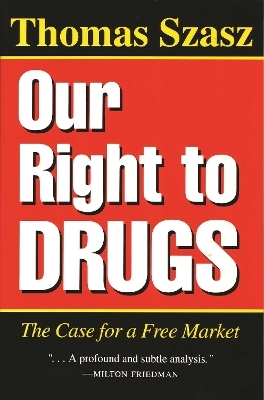
Our Right to Drugs
The Case for a Free Market
Seiten
1996
Syracuse University Press (Verlag)
978-0-8156-0333-7 (ISBN)
Syracuse University Press (Verlag)
978-0-8156-0333-7 (ISBN)
This work shows how the present drug war started at the beginning of this century, when the US government first assumed the task of protecting people from patent medicines. It demonstrates, however, the deleterious effects of prescription laws, which place people under lifelong medical supervision.
In ""Our Right to Drugs"", Szasz shows how the present drug war started at the beginning of this century, when the US government first assumed the task of protecting people from patent medicines. By the end of World War I the free market in drugs was but a dim memory. Instead of dwelling on the familiar impracticality and unfairness of drug laws, Szasz demonstrates the deleterious effects of prescription laws, which place people under lifelong medical supervision. The result is that most Americans today prefer a coercive and corrupt command drug economy to a free market in drugs. Szasz stresses the consequences of the fateful transformation of the central aim of US drug prohibitions: from protecting the public from being fooled by mis-branded drugs to protecting them from harming themselves by self medication. He emphasises that a free society cannot endure if the state treats adults as if they were truant children and if its citizens reject the values of self-discipline and personal responsibility. After discussing the racial aspects of drug prohibition (eg. drug enforcers are far more likely to accost blacks than whites), Szasz suggests a connection between drug prohibition and the personal dread of the availability of an easy and pleasurable way to commit suicide.
In ""Our Right to Drugs"", Szasz shows how the present drug war started at the beginning of this century, when the US government first assumed the task of protecting people from patent medicines. By the end of World War I the free market in drugs was but a dim memory. Instead of dwelling on the familiar impracticality and unfairness of drug laws, Szasz demonstrates the deleterious effects of prescription laws, which place people under lifelong medical supervision. The result is that most Americans today prefer a coercive and corrupt command drug economy to a free market in drugs. Szasz stresses the consequences of the fateful transformation of the central aim of US drug prohibitions: from protecting the public from being fooled by mis-branded drugs to protecting them from harming themselves by self medication. He emphasises that a free society cannot endure if the state treats adults as if they were truant children and if its citizens reject the values of self-discipline and personal responsibility. After discussing the racial aspects of drug prohibition (eg. drug enforcers are far more likely to accost blacks than whites), Szasz suggests a connection between drug prohibition and the personal dread of the availability of an easy and pleasurable way to commit suicide.
| Erscheint lt. Verlag | 30.4.1996 |
|---|---|
| Verlagsort | New York |
| Sprache | englisch |
| Maße | 152 x 229 mm |
| Gewicht | 340 g |
| Themenwelt | Geisteswissenschaften ► Philosophie ► Ethik |
| Recht / Steuern ► EU / Internationales Recht | |
| Recht / Steuern ► Privatrecht / Bürgerliches Recht ► Medizinrecht | |
| Sozialwissenschaften ► Politik / Verwaltung ► Staat / Verwaltung | |
| Sozialwissenschaften ► Soziologie | |
| ISBN-10 | 0-8156-0333-9 / 0815603339 |
| ISBN-13 | 978-0-8156-0333-7 / 9780815603337 |
| Zustand | Neuware |
| Haben Sie eine Frage zum Produkt? |
Mehr entdecken
aus dem Bereich
aus dem Bereich


